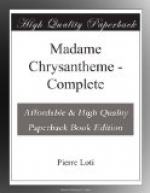Here follow all the emperors, all the spirits, and the interminable list of ancestors.
In her trembling old woman’s falsetto, Madame Prune sings all this, without omitting anything, at a pace which almost takes away her breath.
And very strange it is to hear: at length it seems hardly a human voice; it sounds like a series of magic formulas, unwinding themselves from an inexhaustible roller, and escaping to take flight through the air. By its very weirdness, and by the persistency of its incantation, it ends by producing in my half-awakened brain an almost religious impression.
Every day I wake to the sound of this Shintoist litany chanted beneath me, vibrating through the exquisite clearness of the summer mornings—while our night-lamps burn low before the smiling Buddha, while the eternal sun, hardly risen, already sends through the cracks of our wooden panels its bright rays, which dart like golden arrows through our darkened dwelling and our blue gauze tent.
This is the moment at which I must rise, descend hurriedly to the sea by grassy footpaths all wet with dew, and so regain my ship.
Alas! in the days gone by, it was the cry of the muezzin which used to awaken me in the dark winter mornings in faraway, night-shrouded Stamboul.
CHAPTER XXVIII
A DOLL’S CORRESPONDENCE
Chrysantheme has brought but few things with her, knowing that our domestic life would probably be brief.
She has placed her gowns and her fine sashes in little closed recesses, hidden in one of the walls of our apartment (the north wall, the only one of the four which can not be taken to pieces). The doors of these niches are white paper panels; the standing shelves and inside partitions, consisting of light woodwork, are put together almost too finically and too ingeniously, giving rise to suspicions of secret drawers and conjuring tricks. We put there only things without any value, having a vague feeling that the cupboards themselves might spirit them away.
The box in which Chrysantheme stores away her gewgaws and letters, is one of the things that amuse me most; it is of English make, tin, and bears on its cover the colored representation of some manufactory in the neighborhood of London. Of course, it is as an exotic work of art, as a precious knickknack, that Chrysantheme prefers it to any of her other boxes in lacquer or inlaid work. It contains all that a mousme requires for her correspondence: Indian ink, a paintbrush, very thin, gray-tinted paper, cut up in long narrow strips, and odd-shaped envelopes, into which these strips are slipped (having been folded up in about thirty folds); the envelopes are ornamented with pictures of landscapes, fishes, crabs, or birds.




